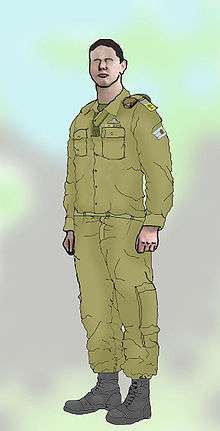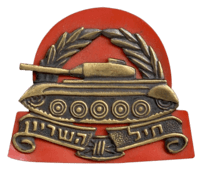Israel Defense Forces insignia
This page details the uniforms and insignia of the Israel Defense Forces, excluding rank insignia. For ranks, see Israel Defense Forces ranks and insignia.
Uniforms

The Israel Defense Forces has several types of uniforms:
- Service dress (Madei Aleph)[1] - "Class A" uniform; everyday wear, worn by enlisted soldiers.
- Field dress (Madei Bet)[2] - "Class B" uniform; worn into combat, training, work on base.
- Officers / Ceremonial dress (Madei Srad)[3] - Ceremonial uniform; worn by officers, or during special events/ceremonies.
- Dress uniform and Mess dress - worn only abroad. There are several dress uniforms depending on the season and the branch. Dress uniforms follow the American model and Mess Dress uniforms follow the British and Commonwealth pattern.
The service uniform for all ground forces personnel is olive green; navy and air force uniforms are beige. The uniforms consist of a shirt, trousers, sweater, jacket or blouse, and shoes or boots. The navy has an all-white dress uniform. Green fatigues are the same for winter and summer and heavy winter gear is issued as needed. Women's dress parallels the men's but a woman may choose to substitute a skirt for the trousers, or sandals for boots.
Some corps or units have small variations in their uniforms - for instance, military policemen wear a white belt and white police hat. Similarly, while most IDF soldiers are issued black leather boots, some units issue reddish-brown leather boots for historical reasons- the paratroopers, Nahal and Kfir brigades, as well as some SF units (Sayeret Matkal, Oketz, Duvdevan, Maglan, Counter-Terror School). Additionally, certain special operations units are issued canvas hiking boots for wear during missions.
Berets

Each corps in the Israel Defense Forces has a beret of a different color and/or a different beret pin worn by its soldiers, independent of rank and position. Israel Defense Forces soldiers wear berets on their heads only on formal occasions, such as ceremonies and roll calls. The beret is placed beneath the left shoulder strap while wearing the service uniform (alef), but not while wearing the combat/work (bet) uniform in the field. On base it is left to the unit's discretion whether to wear berets or field hats. Air force and navy officers, military orchestra soldiers and military police law enforcement soldiers wear combination caps. Formerly, male soldiers of all ranks wore combination caps, while female soldiers wore the garrison cap. In the 1950s, the beret was adopted as the default headgear for the service uniform. The color of the air force beret was blue-gray; armored corps, artillery, and special operations personnel wore a black beret. Paratroopers, following the pattern of the British Army, wore maroon, all other infantry wore olive drab. Combat engineers wore a gray beret. For all other army personnel, except combat units, the beret for men was green and for women, black. Women in the navy wore a black beret with gold insignia while men wore the traditional white sailor cap like that of the US Navy.

| Corps | Color |
|---|---|
| Air Force | |
| Air Force | |
| Infantry Corps | |
| Golani Brigade | |
| Paratroopers Brigade and SF units | |
| Nahal Brigade | |
| Givati Brigade | |
| Kfir Brigade | |
| Armor Corps | |
| Armor Corps | |
| Artillery Corps | |
| Artillery Corps | |
| Combat Intelligence Corps | |
| Combat Intelligence Corps | |
| Engineering Corps | |
| Engineering Corps | |
| Intelligence | |
| Directorate of Military Intelligence | |
| Military Police | |
| Military Police | |
| Border Police | |
| Border Police | |
| Home Front | |
| Home Front Command | |
| General | |
| General Corps | |
| Navy | |
| Sea Corps | |
Beret pins
All berets in the Israel Defense Forces, other than general corps berets (when worn by recruits), have pins attached to their front, which represent the symbol of the corps. While soldiers may wear the beret of another corps due to serving at that corps' base, they will always wear the pin of their native corps. Each pin consists of the corps symbol as well as a certain ornament which also contains the name of the corps. Soldiers serving a term in military prison must wear a blank beret with no pins attached.
| Corps | Pin symbol |
|---|---|
| The Chief of Staff
Rosh HaMate HaKlali (Ramatkal) |
Israel Defense Forces Emblem
 |
| General Staff
HaMate HaKlali |
Sword wrapped by an olive branch |
| Home Front Command
Pikud HaOref (Heil HaOref) |
Sword wrapped by an olive branch with large triangle in the background |
| Military Rabbinate
HaRabanut HaTzva'it |
Figure of the Ten Commandments with a sword in the foreground |
| Military Advocate General
HaPraklitut HaTzva'it |
 |
| Air Force
Heil HaAvir |
 |
| Infantry Corps
Heil HaRaglim |
 |
| Armor Corps
Heil HaShiryon |
 |
| Artillery Corps
Heil HaTothanim |
Cannon/artillery piece |
| Combat Engineering Corps
Heil HaHandasa HaKravit |
 |
| Field Intelligence Corps
Heil Ha'Isuf Ha'Kravi |
|
| Ordnance Corps
Heil HaHimush |
Sword, torch and a cog |
| Medical Corps
Heil HaRefu'a |
Snake around torch with Star of David on the bowl of the torch |
| Intelligence Corps
Heil HaModi'in |
Fleur-de-lis with half a star. |
| C4I Corps
Heil HaTikshuv |
Sword with wings and a pair of lightning bolts |
| Education and Youth Corps
Heil HaHinukh VeHaNo'ar |
 |
| Adjutant Corps
Heil HaShalishut |
Sword wrapped by an olive branch, a book, and a disk |
| Logistics Corps
Heil HaLogistika |
Sword, olive branch and a steering wheel |
| Military Police
Heil HaMishtara HaTzva'it |
Shield and flame |
| Border Police
Mishmar HaGvul (Magav) |
Israel Police Star of David |
| General Corps
HaHayil HaKlali |
Two crossed swords and a fig leaf |
| Navy
Heil HaYam |
Sword wrapped by an olive branch, anchor and seaweed |
Shoulder tags
Typically, each IDF unit (yehida) has its own shoulder tag (tagei katef).[4] Shoulder tags consist of a long section and a tip, which can be one of four shapes: a circle (commands, directorates and air force units except anti-aircraft), a square (Golani Brigade), a diamond, or a shield-like shape (most common). Shoulder tags are only worn on dress uniforms, on the left shoulder attached to the shoulder strap.
Some of the IDF shoulder tags:
Commands
Branches
Corps
Insignia
Aiguillettes, srochim in Hebrew:'[5]
- Black: Instructors at the various Military Schools.
- Blue: Staff at the various Military Schools.
- Red: Instructor at the Airborne Training School.
- White: Educators and trainers in the Education and Youth Corps.
- White & Blue: Mefaked Mishma'at ("Discipline commander"; soldier in charge of unit discipline who assists the unit NCO-in-charge). When worn by Hogrim, it reflects completion of Tironut level 02.
- Blue & Red Cords: Military Police.
- Diced Blue and Red Cord: Prison Service.
- Green: Mefaked (unit or sub-unit commanders). Worn by squad leaders and platoon, company, and battalion commanders to indicate that they have a combat command. When worn by Hogrim, it reflects completion of Tironut level 03.
- Purple: Service Rights Staff. The mashakeet tash ("Service Rights [Female] Staff NCO")[6][7] is a female NCO whose job it is to help conscripts settle into military life and handle any of their complaints or grievances. A specialized female staff NCO who deals with the needs and rights of foreign volunteers is called a mashakeet aliyah, although mashakiot aliyah wear either white or green lanyards.[6][8] There is one NCO assigned to each company HQ.
- Purple & Blue: Reserves Office Staff. In charge of coordinating and keeping track of a unit's reserve forces.
References
- ↑ Historama - Militaria - IDF - Israeli Militaria Primer: DRESS / SERVICE UNIFORMS ("MADEI-ALEF") [sic]
- ↑ Historama - Militaria - IDF - Israeli Militaria Primer: BATTLE-DRESS / WORK UNIFORMS ("MADEI-BET")
- ↑ Historama - Militaria - IDF - Israeli Militaria Primer: UNIFORMS & SHOULDER STRAPS
- ↑ Historama - Militaria - IDF - Israeli Militaria Primer: Further developments (Early 1950s)
- ↑ Arik933 Israeli army ranks and what's what
- 1 2 Kefitzat Haderech; How to Fight The System, #2 Mashakeet Tash
- ↑ tash is short for t’nai sherut or "service rights".
- ↑ Aliyah literally means "ascent"; it symbolically means to immigrate to Israel.
![]() This article incorporates public domain material from the Library of Congress Country Studies website http://lcweb2.loc.gov/frd/cs/.
This article incorporates public domain material from the Library of Congress Country Studies website http://lcweb2.loc.gov/frd/cs/.
External links
Bibliography
- Furlan, M. (1986). Israel Defense Forces Insignia. Canada: Militaria House. p. 68. ISBN 978-0929757124.
- Katz, Sam; Ronald Volstad (1988). Israeli Elite Units since 1948. United Kingdom: Osprey Publishing. p. 64. ISBN 978-0-85045-837-4.
- Katz, Sam; Ronald Volstad (1986). Israeli Elite Units since 1973. United Kingdom: Osprey Publishing. p. 64. ISBN 978-0-85045-687-5.
- Fridman, A. (2010). Jewish Cap Badges: British/Palestine and Israel Defense Forces. Israel. p. 60.
- Lubman, Roman; Shapiro Guy (2011). Israeli Defense Forces and Law Enforcement Hat Badges Catalog. Israel, Jerusalem. p. 92.